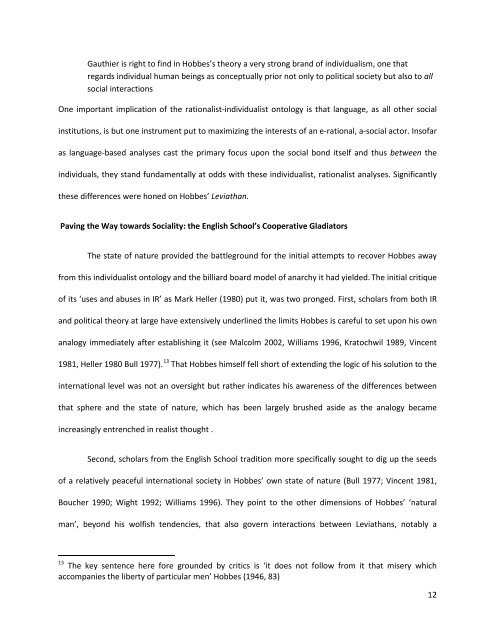1 Theorising Agency in International Relations In Hobbes's Wake ...
1 Theorising Agency in International Relations In Hobbes's Wake ...
1 Theorising Agency in International Relations In Hobbes's Wake ...
You also want an ePaper? Increase the reach of your titles
YUMPU automatically turns print PDFs into web optimized ePapers that Google loves.
Gauthier is right to f<strong>in</strong>d <strong>in</strong> Hobbes’s theory a very strong brand of <strong>in</strong>dividualism, one that<br />
regards <strong>in</strong>dividual human be<strong>in</strong>gs as conceptually prior not only to political society but also to all<br />
social <strong>in</strong>teractions<br />
One important implication of the rationalist-<strong>in</strong>dividualist ontology is that language, as all other social<br />
<strong>in</strong>stitutions, is but one <strong>in</strong>strument put to maximiz<strong>in</strong>g the <strong>in</strong>terests of an e-rational, a-social actor. <strong>In</strong>sofar<br />
as language-based analyses cast the primary focus upon the social bond itself and thus between the<br />
<strong>in</strong>dividuals, they stand fundamentally at odds with these <strong>in</strong>dividualist, rationalist analyses. Significantly<br />
these differences were honed on Hobbes’ Leviathan.<br />
Pav<strong>in</strong>g the Way towards Sociality: the English School’s Cooperative Gladiators<br />
The state of nature provided the battleground for the <strong>in</strong>itial attempts to recover Hobbes away<br />
from this <strong>in</strong>dividualist ontology and the billiard board model of anarchy it had yielded. The <strong>in</strong>itial critique<br />
of its ‘uses and abuses <strong>in</strong> IR’ as Mark Heller (1980) put it, was two pronged. First, scholars from both IR<br />
and political theory at large have extensively underl<strong>in</strong>ed the limits Hobbes is careful to set upon his own<br />
analogy immediately after establish<strong>in</strong>g it (see Malcolm 2002, Williams 1996, Kratochwil 1989, V<strong>in</strong>cent<br />
1981, Heller 1980 Bull 1977). 13 That Hobbes himself fell short of extend<strong>in</strong>g the logic of his solution to the<br />
<strong>in</strong>ternational level was not an oversight but rather <strong>in</strong>dicates his awareness of the differences between<br />
that sphere and the state of nature, which has been largely brushed aside as the analogy became<br />
<strong>in</strong>creas<strong>in</strong>gly entrenched <strong>in</strong> realist thought .<br />
Second, scholars from the English School tradition more specifically sought to dig up the seeds<br />
of a relatively peaceful <strong>in</strong>ternational society <strong>in</strong> Hobbes’ own state of nature (Bull 1977; V<strong>in</strong>cent 1981,<br />
Boucher 1990; Wight 1992; Williams 1996). They po<strong>in</strong>t to the other dimensions of Hobbes’ ‘natural<br />
man’, beyond his wolfish tendencies, that also govern <strong>in</strong>teractions between Leviathans, notably a<br />
13 The key sentence here fore grounded by critics is ‘it does not follow from it that misery which<br />
accompanies the liberty of particular men’ Hobbes (1946, 83)<br />
12
















